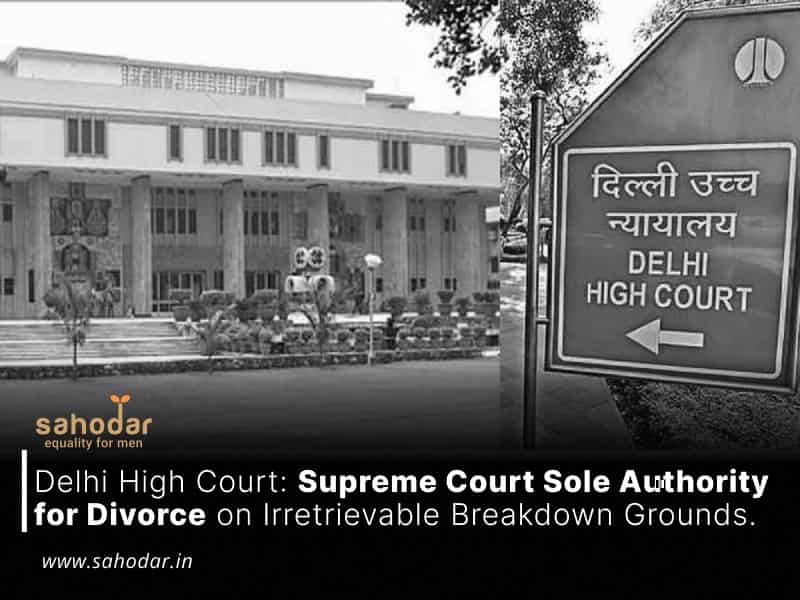The Delhi High Court has authoritatively affirmed that the prerogative to grant a divorce predicated on the irretrievable breakdown of a marriage is exclusively vested in the Supreme Court, as delineated by Article 142 of the Constitution.
In a pertinent case, wherein the Wife appealed against the divorce decree promulgated by the Family Court pursuant to Section 13(1)(i-a) of the Hindu Marriage Act, 1955 (HMA), the Court judiciously determined that the evidentiary presentation proffered by the husband, upon meticulous scrutiny in accordance with the preponderance of probabilities, failed to substantiate allegations of cruelty on the part of his spouse.
“Power to grant divorce on the ground of irretrievable breakdown of marriage is exercised by the Supreme Court under Article 142 of the Constitution of India to do complete justice to both the parties. Such a power is not vested in the High Courts leave alone the Family Courts”, the Bench comprising Justice Sanjeev Sachdeva and Justice Manoj Jain observed.
The Bench noted, “No parallel can be drawn from said judgment by the respondent in view of distinguishing facts of the present case. Moreover, as already noted, the power to dissolve marriage on account of “irretrievable breakdown‟ vests with the Supreme Court only, which also cannot be sought by any of the parties as a matter of right”.
Advocate Sunil Malhotra appeared on behalf of the Respondent.
The Appellant, identified as the Wife, invoked the jurisdiction of the Court to contest the verdict of the Family Court, which had granted her husband’s petition for divorce under Section 13(1)(i-a) of the Hindu Marriage Act (HMA).
In its deliberation, the Court acknowledged the absence of a statutory definition for the term “cruelty” as stipulated in Section 13(1)(i-a) of the HMA. This statutory ambiguity complicates the judicial determination of the precise nature of cruelty. The Bench expounded that cruelty encompasses both physical and mental aspects, either individually or in combination. While physical cruelty may be substantiated through corroborative evidence, mental cruelty remains inherently subjective and challenging to quantify. The Court underscored that ascertaining mental cruelty necessitates a comprehensive assessment of an array of interrelated factors particular to each case.
In addition, the Court mentioned a previous decision by the Supreme Court (Samar Ghosh v. Jaya Ghosh, 2007) and emphasized that there’s no one-size-fits-all approach to determine cruelty. It should be based on a careful look at the specific facts in each case.
The Court also pointed out that the husband’s claims of cruelty by his wife weren’t backed up by evidence. Two main reasons led to this conclusion. First, the husband asked for a local commissioner to confirm that his wife was running a coaching center but didn’t provide any solid proof, just verbal claims. Second, even if we assume his wife was involved in such a center, the husband didn’t explain how that alone could be considered cruelty.
“Thus, the picture which emerges out is very clear. There was loss of trust, faith and affection between the parties but despite that, they both were trying hard to save the family. The husband even withdrew his case seeking restitution of conjugal rights. His mother also withdrew her one complaint”, the Court noted.
Accordingly, the Court allowed the Appeal and set aside the impugned order.

